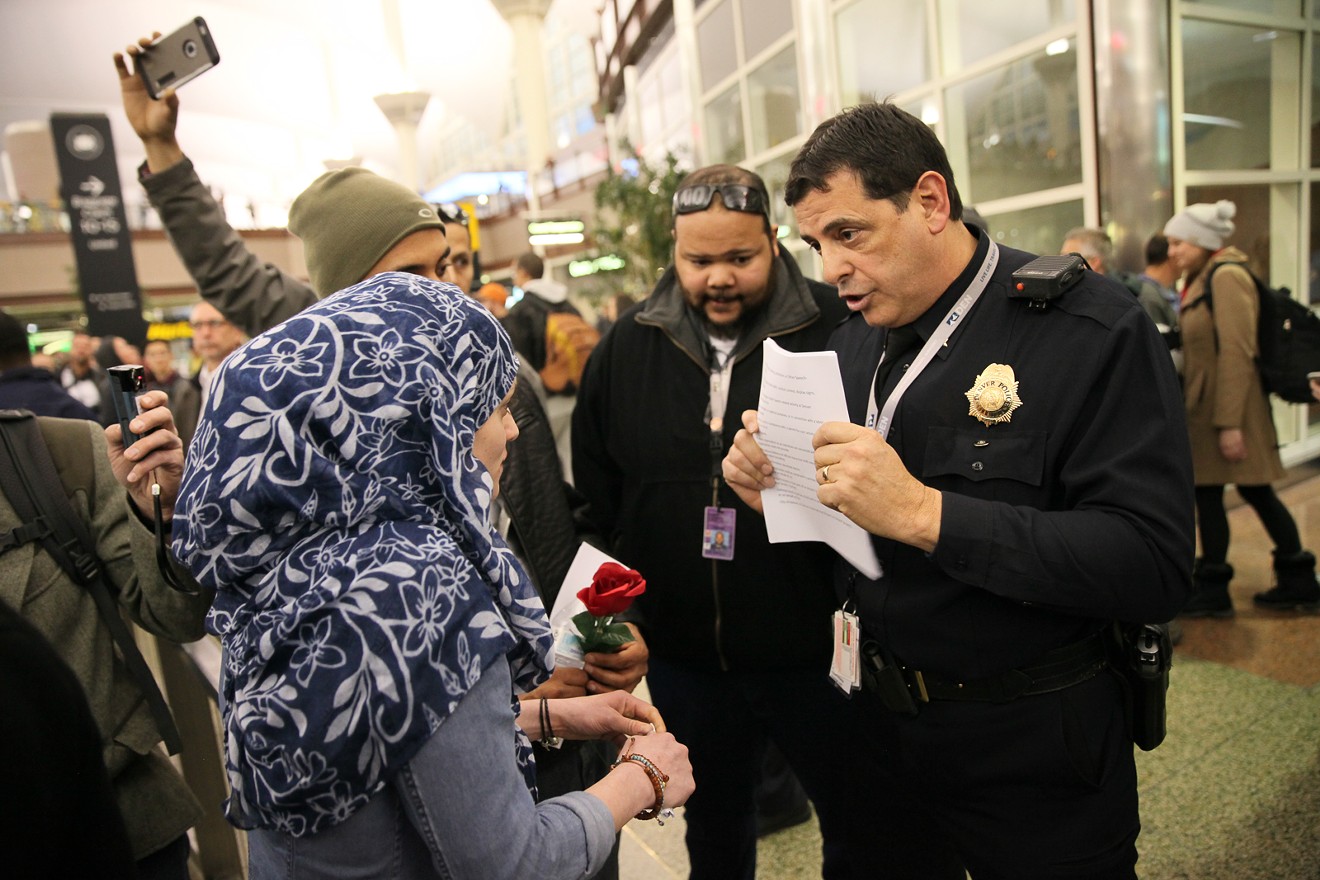“The judge said that the portion of the regulation that didn’t allow for expedited permitting was unconstitutional,” says Andrew McNulty, an associate attorney at Killmer, Lane & Newman, who represented the plaintiffs.
Now protesters need only 24 hours to apply for a permit, as opposed to the seven days DIA originally required. The judge also ruled that the airport had to allow people to protest in areas of their choosing where they could reach their audience, like domestic and international arrivals, or “places where people congregate to meet their loved ones,” McNulty says, as long as they did not interrupt airport security. Following the judge’s decision, protesters will also be able to carry signs larger than one foot by one foot.
“It’s a win for the First Amendment and anyone who believes in First Amendment protections,” McNulty says. “It will allow for people, like the president does, to use the 24-hour news cycle to communicate their message on issues of public concern and importance.”
DIA issued a statement shortly after the decision:
Denver International Airport’s primary responsibility is to ensure the safety, security and efficient movement of its passengers, tenants and employees. In order to do so, it must retain the ability to limit the size and appropriate location for a demonstration. That’s why the airport is considering its options regarding today’s court decision. The airport remains committed to balancing the rights of individuals to express themselves with the need to protect passengers and airport operations.
Continue reading for our original coverage of the permitting issue.
Original story: More outrageous national news breaks, and you immediately want to organize a protest to address what’s happening. But you’d also prefer that the protest be approved by the city, with local law enforcement briefed and prepared to protect demonstrators and their First Amendment rights.
The problem?
There is no easy or guaranteed way to obtain a permit for demonstrating in Denver within 24 hours of major news breaking.
The Denver Department of Parks and Recreation, which oversees areas like the Greek Amphitheatre at Civic Center Park, asks that protest organizers apply for permits fifteen days ahead of time. Denver International Airport wants seven days' notice. In e-mails to Westword, both departments said they will try their best to work with last-minute requests, but noted that they have no special or expedited processes to accommodate protests that spring up quickly.
This became apparent at the airport on Saturday, January 28, when hundreds of demonstrators showed up to protest President Donald Trump’s executive order on immigration.
The situation became tense when Denver Police Commander Antonio “Tony” Lopez threatened to arrest demonstrators because they didn’t have a permit to protest at DIA. In videos captured that night, Lopez is seen saying that First Amendment Rights, including the ability to hold up a copy of the Constitution, do not apply at the airport unless a demonstrator has first obtained a permit.
DPD officers eventually accommodated the demonstration by allowing participants to congregate outside on the plaza between the terminal and the Westin Hotel. But the exchange with Lopez has already resulted in a lawsuit, filed on February 6 by civil-rights attorney David Lane, on behalf of two demonstrators who feel their First Amendment rights were violated.
The protest’s organizers say they did look into obtaining a permit beforehand, but were told by DIA officials that the airport requires seven days to consider any permit requests. According to Amal Kassir, the Syrian slam poet who led the demonstration, one of her friends had called the airport early on January 28 to request a permit. At first the airport official who answered the phone said that it needed two days to consider the request, then revised that number to seven days, they say.
DIA spokesman Heath Montgomery says his office has no record of a formal permit being requested before the protest, but confirms the standard time frame for a permit in an e-mail to Westword.
“The rule requires a person to submit a request for a permit at least seven days prior to event. The airport can’t guarantee that an application of a permit submitted less than seven days in advance will be approved,” Montgomery says.
Kassir says that she and her friends gave up on trying to get a permit after they heard that DIA wanted seven days to consider the request; the protest was already set for that day. Instead, they came up with the idea of framing their demonstration as a “Welcome Home” event for their friend Omar, since “Welcome Home” signs are commonly allowed in the terminal.
“The ‘Welcome Home Omar’ campaign made it so we legally had the right to be there no matter what,” says Kassir. “Moral of the story is, we had no permit, and if it wasn't for Omar, we would've been arrested. Either way, we peacefully assembled as per our right in the Constitution.”
Not surprisingly, Omar was stunned when he arrived on a domestic flight that night and found a large crowd waiting for him. Still, Commander Lopez was not buying the whole “Welcome Home” justification. It took local politicians like Denver City Councilman Paul Lopez and State Representatives Leslie Herod and Joseph Salazar showing up to ease tensions between the police and protesters.
“I’ve known Tony [Lopez] for a decade or longer," says Salazar. "I find him to be an amazing law enforcement officer. But what happened on Saturday was very bizarre, because [DPD] came in with the purpose of clearing people out."
In videos captured that night, Herod and Salazar can be seen negotiating with Lopez. Their exchange includes Lopez’s assertion that holding up a copy of the Constitution is not allowed, a statement that Salazar says he found “shocking.”
“I said, 'Hold on, where’s your expedited permit process?'” recalls Salazar. After all, the executive order had been issued just the day before.
“I said you need to have an expedited process so you can avoid this situation,” Salazar continues. “People better start adapting quickly to what’s happening, because people are furious and scared and want to express themselves. The best thing that lawmakers can do is find a happy medium so [protesters] can express themselves. Because if they try to bottle up [protesters] or push them away, it’s not going to end up well."
According to Cyndi Karvaski of Denver Parks and Recreation, permits are not required to peacefully assemble on sidewalks or in Denver’s park spaces, “unless the Manager of Parks and Recreation determines that the proposed activity creates an immediate, clear and present danger to public health, safety or welfare or violates ordinances or published rules and regulations.”
Yet permits do help protect demonstrators from being cited for violations of time, manner and place restrictions. It is also a good idea to have a permit in anticipation of any traffic disruptions that might occur.

The recent "Protect our Muslim Neighbors" Rally at the Greek Ampitheatre on Saturday, February 4.
Brandon Marshall
“If an organizer wants to reserve a location in a park for an assembly/demonstration, they need to submit an application fifteen days in advance,” she says. “If they miss that deadline, we will do our best to work with them to process the application and issue the permit, but there is no guarantee. The size, scope and complexity of the proposed activity are the biggest driving factors that determine whether we can accommodate a late application…. The purpose of the permit is to protect our parks. One aspect of this is to assess possible needs of the organizer. For example, notifying our staff and ensuring adequate porta-toilets, trash cans, etc., based on the number of the attendees.”
The speed and frequency with which protests will spring up in the era of Trump are not lost on city officials; they addressed the question of expedited permits at a forum on sanctuary cities that was held at North High School on February 2.
When the protest at DIA came up during discussions, Deputy City Attorney Cristal DeHerrera acknowledged the need for an expedited process for applying for permits. “We are looking into it,” she promised the crowd.














